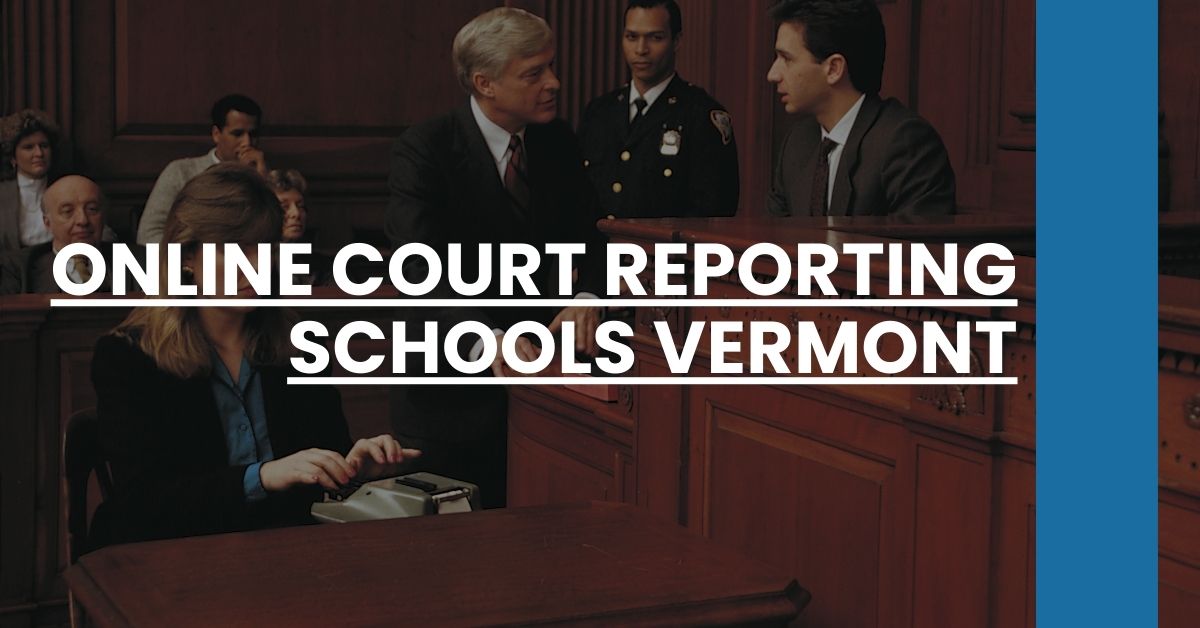Court Reporter School: Your Path to a Rewarding Career

In the fast-paced world of legal proceedings, where every word carries weight and precision is paramount, court reporters play a pivotal role in ensuring the integrity of the justice system. These unsung heroes of the courtroom are responsible for creating an accurate and verbatim record of legal proceedings, a task that demands exceptional skill, focus, and dedication. If you’re considering a career that combines technology, language, and the law, court reporter school might be your gateway to a fulfilling and in-demand profession.
The Art of Capturing Every Word

Court reporting is an art that transforms spoken language into a written transcript with remarkable speed and accuracy. At its core, the profession relies on a unique skill set that involves stenography, voice writing, or digital recording methods. Stenography, the most prevalent technique, utilizes a specialized machine called a stenotype, which allows reporters to input words and phrases using a phonetic system. This method enables court reporters to keep pace with rapid dialogue, ensuring that every utterance is captured.
The training to become a court reporter is rigorous and comprehensive. Students enroll in specialized programs offered by court reporter schools, where they undergo an intensive curriculum. These programs typically cover:
- Stenography Theory: Students learn the stenotype machine’s layout and the principles of phonetic writing, gradually building speed and accuracy.
- Legal Terminology: A deep understanding of legal jargon and procedures is essential for effective court reporting.
- English Grammar and Punctuation: Transcripts must adhere to strict grammatical rules, ensuring clarity and precision.
- Real-Time Reporting: Advanced training focuses on simultaneous transcription, a skill crucial for live proceedings.
- Ethics and Professionalism: Court reporters must maintain impartiality and confidentiality, upholding the integrity of the legal process.
A Day in the Life of a Court Reporter

Imagine stepping into a courtroom, where the air is thick with anticipation and every word spoken could shape the outcome of a case. As a court reporter, you take your seat, fingers poised over the stenotype machine, ready to capture the proceedings with unwavering accuracy. The judge’s gavel sounds, and the trial commences.
Beyond the courtroom, court reporters are also essential in depositions, where they record out-of-court testimonies, and in various legal settings, such as arbitrations and hearings. The ability to work in diverse environments makes this career both dynamic and rewarding.
The Demand for Skilled Court Reporters
The legal system’s reliance on accurate records has created a consistent demand for qualified court reporters. According to the U.S. Bureau of Labor Statistics, the employment of court reporters is projected to grow by 9% from 2021 to 2031, faster than the average for all occupations. This growth is attributed to the increasing complexity of legal proceedings and the need for precise documentation.
Moreover, the skills acquired in court reporter school are highly transferable. Graduates can explore careers in captioning, providing real-time text for live events and broadcasts, or in CART (Communication Access Realtime Translation) reporting, assisting individuals with hearing impairments. These alternative paths showcase the versatility of the training received.
Choosing the Right Court Reporter School
Selecting an accredited court reporter school is a crucial step towards a successful career. Prospective students should consider the following factors:
- Accreditation: Ensure the school is accredited by recognized bodies, guaranteeing a quality education.
- Curriculum: Review the course structure, ensuring it covers all essential skills, including stenography, legal terminology, and real-time reporting.
- Instructor Expertise: Experienced instructors with industry knowledge can provide valuable insights and mentorship.
- Job Placement Assistance: Schools offering career services can facilitate the transition from student to professional.
- Flexibility: Consider online or part-time options if you require flexibility due to work or personal commitments.
Overcoming Challenges and Embracing Rewards

Becoming a court reporter is not without its challenges. The learning curve can be steep, and mastering stenography requires dedication and practice. However, the rewards are equally significant. Court reporters enjoy a unique perspective on the legal system, witnessing history in the making during high-profile cases. The sense of contributing to the fairness and transparency of the justice system is a powerful motivator.
"As a court reporter, I've had the privilege of documenting some of the most pivotal moments in legal history. It's a responsibility I hold with great pride, knowing that my work ensures the accuracy of the record." - Anonymous Court Reporter
Additionally, the profession offers flexibility and autonomy. Many court reporters work as freelancers or contractors, allowing them to set their schedules and choose assignments. This freedom, coupled with the potential for excellent earnings, makes court reporting an attractive career choice.
Frequently Asked Questions
How long does it take to become a certified court reporter?
+The duration varies depending on the program and individual progress. Typically, it takes 2-4 years to complete the necessary training and obtain certification. Accelerated programs may be available for those with prior experience or education.
What are the physical demands of court reporting?
+Court reporting requires good hand-eye coordination and finger dexterity for stenotype machine operation. Reporters must also maintain focus and concentration for extended periods. However, with proper training and ergonomics, these demands can be managed effectively.
Can court reporters work remotely?
+Yes, remote work opportunities are available, especially in captioning and CART reporting. With the right technology and setup, court reporters can provide real-time transcription services from remote locations, offering flexibility and diverse work environments.
What is the average salary for court reporters?
+Salaries vary based on experience, location, and employment type. According to the BLS, the median annual wage for court reporters was $60,130 in May 2021. Freelance reporters may earn higher incomes, especially with specialized skills and experience.
How can I prepare for court reporter school?
+Developing strong English language skills, including grammar and punctuation, is essential. Familiarizing yourself with legal terminology and basic keyboarding skills can also give you a head start. Researching the profession and understanding the demands of the job will help you make an informed decision.
In conclusion, court reporter school offers a unique and rewarding career path for those with a passion for language, technology, and the law. It is a profession that demands precision, focus, and dedication, but in return, it provides a front-row seat to the legal system’s inner workings. As the legal landscape continues to evolve, the role of court reporters remains indispensable, ensuring that every word spoken in the pursuit of justice is preserved for the record. With the right training and a commitment to excellence, you can embark on a career that is both challenging and profoundly satisfying.



